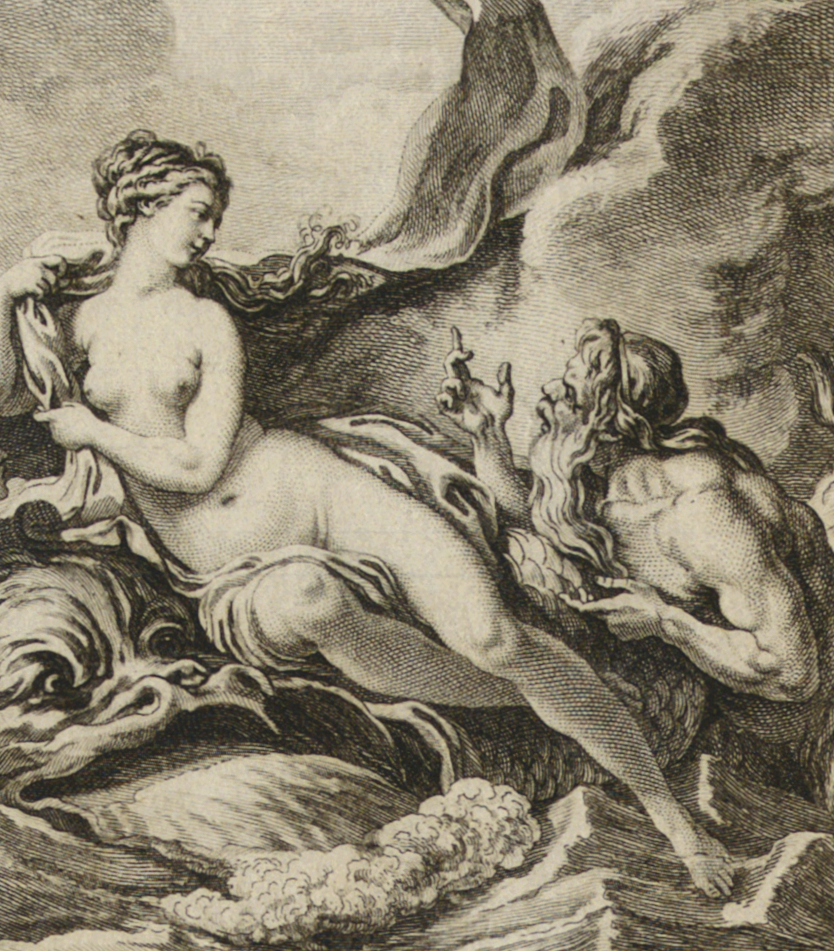In Greek mythology, Proteus is an early prophetic sea god or god of rivers and oceanic bodies of water, one of several deities whom Homer calls the “Old Man of the Sea” (hálios gérôn). Some who ascribe a specific domain to Proteus call him the god of “elusive sea change”, which suggests the changeable nature of the sea or the liquid quality of water. He can foretell the future, but, in a mytheme familiar to several cultures, will change his shape to avoid doing so; he answers only to those who are capable of capturing him. From this feature of Proteus comes the adjective protean, meaning “versatile”, “mutable”, or “capable of assuming many forms”. “Protean” has positive connotations of flexibility, versatility and adaptability. According to Homer (Odyssey iv: 365), the sandy island of Pharos situated off the coast of the Nile Delta was the home of Proteus, the oracular Old Man of the Sea and herdsman of the sea-beasts. In the Odyssey, Menelaus relates to Telemachus that he had been becalmed here on his journey home from the Trojan War. He learned from Proteus’s daughter Eidothea (“the very image of the Goddess”), that if he could capture her father, he could force him to reveal which of the gods he had offended and how he could propitiate them and return home. Proteus emerged from the sea to sleep among his colony of seals, but Menelaus was successful in holding him, though Proteus took the forms of a lion, a serpent, a leopard, a pig, even of water or a tree. Proteus then answered truthfully, further informing Menelaus that his brother Agamemnon had been murdered on his return home, that Ajax the Lesser had been shipwrecked and killed, and that Odysseus was stranded on Calypso’s Isle Ogygia.
| Alias Proteus |
| Real Names/Alt Names Proteus |
| Characteristics Myths & Legends, Deity, Shapeshifter, Prehuman Epoch |
| Creators/Key Contributors Homer |
| First Appearance Greek mythology |
| First Publisher ○ |
| Appearance List Literature: Homer’s Odyssey Book 4 (c. 8th century BCE, English 1614), Homer’s Iliad (c. 8th century BC), Virgil’s Aeneid (29 to 19 BC), 5th century plays by Aeschylus, Sophocles (Ajax, Philoctetes), and Euripides (Hecuba, Rhesus, Cyclops), Plato’s Hippias Minor, Shakespeare’s Troilus and Cressida (1602), Dante Alighieri’s Divine Comedy (1308–1320), Lord Tennyson’s “Ulysses” (1842), The Story of Greece: Told to Boys and Girls by Mary Macgregor (191-?) [Internet Archive], Frederick Rolfe’s The Weird of the Wanderer (1912), James Joyce’s Ulysses (1918–1920), Nikos Kazantzakis’ The Odyssey: A Modern Sequel (1938), Eyvind Johnson’s Return to Ithaca (1946), The Luck of Troy (1961), et. al. Film: The Mysterious Island (1905), L’Odissea (1911), Ulysses (1954), Ulysses (1955), The Trojan Horse (1961), The Fury of Achilles (1962), Ulysses Against the Son of Hercules (1962), The Lion of Thebes (1964), et. al. Comics: Blue Bolt vol. 2 #1-2, Treasure Chest vol. 14 #5. |
| Sample Read The Odyssey (Translated by W. C. Bryant, August, 1871) [Standard eBooks] |
| Description In Greek mythology, Proteus is an early prophetic sea god or god of rivers and oceanic bodies of water, one of several deities whom Homer calls the “Old Man of the Sea” (hálios gérôn). Some who ascribe a specific domain to Proteus call him the god of “elusive sea change”, which suggests the changeable nature of the sea or the liquid quality of water. He can foretell the future, but, in a mytheme familiar to several cultures, will change his shape to avoid doing so; he answers only to those who are capable of capturing him. From this feature of Proteus comes the adjective protean, meaning “versatile”, “mutable”, or “capable of assuming many forms”. “Protean” has positive connotations of flexibility, versatility and adaptability. According to Homer (Odyssey iv: 365), the sandy island of Pharos situated off the coast of the Nile Delta was the home of Proteus, the oracular Old Man of the Sea and herdsman of the sea-beasts. In the Odyssey, Menelaus relates to Telemachus that he had been becalmed here on his journey home from the Trojan War. He learned from Proteus’s daughter Eidothea (“the very image of the Goddess”), that if he could capture her father, he could force him to reveal which of the gods he had offended and how he could propitiate them and return home. Proteus emerged from the sea to sleep among his colony of seals, but Menelaus was successful in holding him, though Proteus took the forms of a lion, a serpent, a leopard, a pig, even of water or a tree. Proteus then answered truthfully, further informing Menelaus that his brother Agamemnon had been murdered on his return home, that Ajax the Lesser had been shipwrecked and killed, and that Odysseus was stranded on Calypso’s Isle Ogygia. |
| Source Proteus – Wikipedia |

